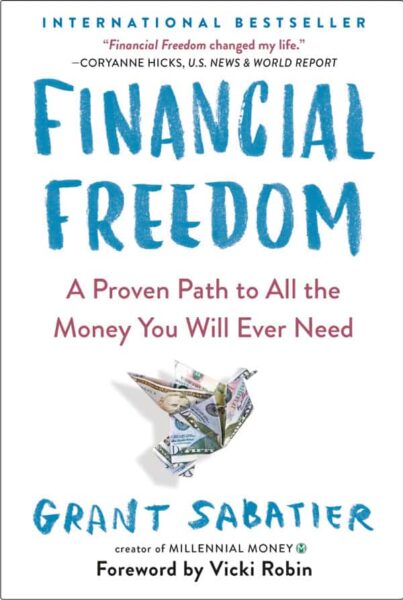I finished another business book, Financial Freedom by Grant Sabatier which is meant to help you reach a point in your finances where you can be free to do what you want. It might not mean retiring from working or not earning any more money (or it could) but rather meaning you can do what you want when you want. So, you can spend your time doing the work you love rather the work you have to do.

I absolutely love the goal of the book I just don’t love how you have to execute it which is impossible for most people. My first impression of Financial Freedom which I covered in my last book review was that it started with a good story. The author’s storytelling abilities are excellent in the beginning and throughout the book.
Unfortunately, storytelling doesn’t make the book effective, it just makes it entertaining. So, the entertainment value of the book Financial Freedom was good but it wasn’t effective at telling me a lot of new information. Perhaps I’ve read too many of these types of books so this was nothing new but that’s a problem if it’s just like all other books like this.
If you haven’t read a lot of financial books that are meant to help you reach financial freedom then this book is worth your time. It’s written well and has good information, the problem is for someone who has read others like is that it’s just like all others.
The ultimate premise of the book is, to reach financial freedom you have to make as much money as you can while increasing how much you save to a ridiculous level that’s impossible for most. If you end up earning $150,000 per year then yes, you can easily increase your savings level to 80% if you’re single. If you’re married and the sole income then maybe you could save 50% of that (could easily!)
The problem comes in when you’re making $80-90k per year as the only income of a family and the message you’re being told is that you should be able to save 50% or even more. If you can’t then you have to earn more.
Oh, excuse me for not making more, I should just do that and then all would be good, right? It’s always easy to make more money. The problem is it’s not that easy to make more money, believe me I’ve tried everything and more money doesn’t come that easily. None of the information in the book actually applies to the real world, only the fictional bubble that exists only to a handful of people.
I don’t doubt the stories told in the book exist, I just think they exist for a small handful of people. In the reality of most of the world they don’t and can’t exist. I try everything to make more money on side hustles but I’ve spent about seven years doing so with very little success in making any amount of money that moves the needle. I’ve increased my savings but I’ve just about resigned myself to retiring no earlier than 65 or even 70. But I’ve had to become okay with that.
That doesn’t mean I will stop my side hustles that are mediocre at best, though. I enjoy them with a passion and think they add a lot of value and joy to my life.
So, back to the book, though, rather than just talking about my life and lack of ability to apply financial freedom to it at all. There are some quotes in the book that I marked. I always look out of good quotes and joke quotes and unfortunately I ended up with most just joke quotes from this one. I am afraid the book is just not grounded in reality at all. It’s completely grounded on one person’s ability to break free of reality and get lucky. Most will not, no matter how hard they try (the unfortunate reality).
Here are my two favorites which both happen to come from chapter 4:
A lot of personal finance books advise you to pay down your debt by paying off the lowest balance first.
Excerpt From: Grant Sabatier. “Financial Freedom.”
No Grant, no financial book or financial advice ever advises that. They always advise you pay off the loan with the highest interest first. I have never ever ever in my life seen any financial advice tell me to pay off the lowest balance first so I can get a “quick hit” of payoff success.
Here’s the second one.
Many experts will tell you to “set it and forget it,” because, the thinking goes, the less effort you have to exert, the more likely you will be to do something that can benefit you over the long run.
Excerpt From: Grant Sabatier. “Financial Freedom.”
I’ve never heard this advice, either. I’m not limited in my experience with financial news, books, and more either, so I’m pretty sure it’s not just me.
That’s all I have notated from the entire book. If you’ve never read a financial book before then this one would be a good option because it is entertaining. It’s mostly not realistic though but there are a few tidbits of good advise.
The one good piece of information I did pull from it is about ETFs. I’ve done a lot of investing with Robinhood in the past but have only played with individual stocks. Mostly just buying, but I was fortunate enough to sell everything right before the COVID-19 crash because we needed liquid cash for our move. I’ve since reinvested all that plus a lot more.
Anyway, I looked at the gain from all my individual stocks and it was about 50% for the past year which is right inline with ETFs (pools of a certain type of stock). Gains for most ETFs for that same period are right inline with my investment. So I could have avoided all that hard work of looking for the right stocks and just purchased into an ETF that I agreed with (I don’t want any Halliburton stock!) I would have done just the same financially yet saved many hours of work.
So, if you’re doing stocks or want to do stocks, stick with a good ETF that has done decent in the past. It will save you a lot of time and effort. Oh, and you can purchase ETFs in Robinhood which is what I’m going to now do. I recommend opening a Robinhood account and if you use my link you get a free stock too! Can’t beat free money!
The book wasn’t a total bust and since I got it for a deal, it was worth it. I don’t think any book I’ve read is a complete bust because there’s always something of value even if most of a book is not.
Next Book, Fun Book
I just started a new book the morning that I’m writing this blog post (the day before it’s posted) and so far it’s decent. It’s not amazing but I have a feeling it’s going to get amazing.
The book is The Hungry Road by Marita Conlon-McKenna which is about the Irish potato famine. Yes, I’m back in Ireland again after reading Ireland a few books ago. The last book I read on Ireland was great and one of the stories in the book was about the Irish potato famine.
While I knew about the potato famine at a basic level and got a bit more knowledge from the last book about Island, I’m really looking forward to the deeper stories about it in this book. Historical fiction always gives you a really entertaining view into a historical event while also being relatively true to history. So, you get a lesson on a historical even without the bore of it being told straightforward with no embellishments.
On to Ireland! Again.
